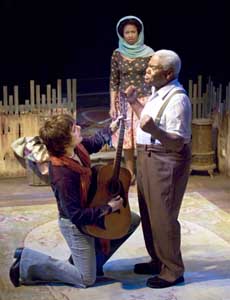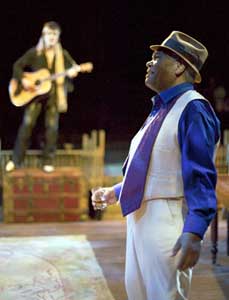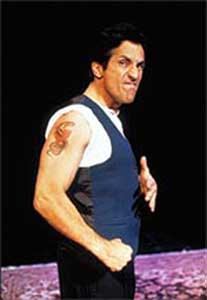-
- Pro-family group rallies in San Diego against same-sex marriage rights
- Test of unusual strain of HIV not from San Diego
- UC San Diego investigates report of campus TV sex broadcast
- Tenth annual Family Matters conference March 5
- Ebony Pride Film Festival goes on despite complaints Films will hightlight GLBT issues
- Community News
-
- Musgrave, Beauprez on GOP ‘endangered’ list
- Party switcher says Democrats are ‘same-sex marriage crowd’
- Transgender inmate released 11 years after Supreme Court ruling
- Judge dismisses charges against anti-gay activists
- Alan Keyes’ daughter urges support for young GLBT people
- PBS chief under fire for cartoon show with lesbian couple will step down
- District bars gay dance at high school
- Same-sex marriage Valentine’s Day debate
- National News Briefs
- World News Briefs
Arts & Entertainment
The bluesman and the confused man
Published Thursday, 24-Feb-2005 in issue 896
I Just Stopped by to See the Man
“If you’re gonna sing the blues, you’ve got to have the blues.”
—- Jesse Davidson
Mississippi Delta bluesman Jesse Davidson (Henry Afro-Bradley) has had the blues so long he’s even allowed the world to think him dead.
Jesse lost his wife Angela in a car crash with an unidentified man some 15 years ago. The loss so devastated him that he hung up his guitar and allowed the press to report him as the dead man.
Now it’s 1975 and Jesse lives in seclusion in a broken-down house at the crossroads (“so I can spot trouble comin’ in all directions”) with his college-educated, black activist daughter Della (Tracey A. Leigh), who has her own problems. Jesse has stripped life to one essential – the Baptist church next door, where he frequently goes to pray.
Into Jesse’s carefully constructed cocoon crashes Karl (Manoel Felciano), a young British rock star with more energy than sense and a burning desire to meet the great bluesman.
But I digress for a little history: The blues originated among black slaves in the cotton fields and kitchens of the American South. Cutting to the raw core of human experience – losing a love, fighting, being on the lam, working for “the man” and miseries of many other sorts, the blues speak to nearly everyone on one level or another.
The art form languished among American blacks (who regarded the music as too much of the past) until the 1970s, when many British rock groups, stagnating musically, found new life and inspiration by appropriating some of the classic blues repertoire.
I Just Stopped by to See the Man is the story of these three characters brought together by the blues – Jesse, just looking for serenity; Karl, in search of money and a chance to hear the great man play again; and Della, quick to assume the worst about Karl and tag him as the sort the movement would like to exterminate: whites who expropriate property not rightly theirs for personal financial gain.
This trio performs a sort of wary pas de trois in I Just Stopped by to See the Man, Stephen Jeffreys’ play about regret, anger, politics, forgiveness, mistakes and, well, the blues, plays through March 13 at the Old Globe’s Cassius Carter Centre Stage.
The character of Jesse (loosely based on legendary blues guitarist Robert Johnson, who supposedly sold his soul to the devil in exchange for his musical talent) is an old man, no longer a musical force (after all, the church considers the blues the “devil’s music”), who has allowed his world to shrink to this little house, the church and Della.
But his guitar, dubbed Angela, remains there on the wall, waiting patiently.
I Just Stopped by to See the Man is less a play than a lesson in how pain can make us constrict our lives and thereby restrict our joy. Jesse has given up what he loved best. Della’s commitment to political change has narrowed her vision to the point that she sees people as political objects, to be pigeonholed as “with us” or “against us.”
The show boasts three fine performances, and Director Seret Scott has inserted welcome music where the play originally did not call for it.
But the script lets them all down, blunting the dramatic effect by telling rather than showing the story. Jesse tells about Angela’s death and his withdrawal from the music scene. Della tells why she has recently moved in with Jesse. Karl tells us why Jesse is important. But the audience doesn’t get to see any of it; it’s more like a lecture than a dramatic presentation.
Theater is a visual medium. Despite the great potential of the topic and three capable actors, there’s too much talk, too little drama.
I Just Stopped by to See the Man plays through March 13 at the Old Globe’s Cassius Carter Centre Stage. Shows Tues., Wed. and Sun. at 7:00 p.m.; Thurs-Sat. at 8:00 p.m.; matinees Sat. and Sun. at 2:00 p.m. For tickets call (619) 234-5623, or visit www.gaylesbiantimes.com for a link to their website.
The Male Intellect: An Oxymoron?
Freud didn’t know what women want. Neither does Robert Dubac, but he’ll make you howl with laughter as he tries to figure it out.
Dubac’s one-man show, irresistibly titled The Male Intellect: An Oxymoron?, is playing an extended run at The Theatre in Old Town. This is a return engagement; the show won the 2003 San Diego Theatre Critics Circle award for best touring production.
It’s easy to see why. Dubac is a master of the short, direct hit. Here’s the opener: “To men, the Three Stooges are funny. To women, three stooges are just redundant.”
That’s just one example of why men and women have trouble communicating.
Another: Women have two X chromosomes. “We only have one X; we can only understand half of what you’re talking about.”
Then there’s the right brain, left brain dichotomy. Dubac gives us a visual tour through his brain: the right (intuitive, creative) side empty except for a chalkboard; the left side cluttered with all sorts of useless stuff, including a phone for the call he hopes will come from his girlfriend Julie (the one who dumped him).
But Dubac doesn’t try to figure women out alone. He plays five other, equally mystified characters, described in the program as “The Chauvinists.”
Love-‘em-and-leave-‘em Fast Eddie has discovered the fatal attraction some women have for unreliable men, and gives them what they want.
“Yeah, they whine about always falling for the wrong kind of guy, but the right kind of guy doesn’t make ‘em quiver.”
Old Mr. Linger (123 years old) wants to find out what women want before he dies.
Ronnie Cabrezzi, from the Bronx projects, sounds like a hood but actually has a sensitive side he’s not afraid to show.
The Colonel (retired) finds truth only in crossword puzzles.
French foreign exchange student Jean-Michel maintains that women want passion: “Honesty and communication they can get from their little brother.”
Like the blind men and the elephant, each character has a piece of the puzzle, but none of them can put it all together.
But women don’t escape unscathed either. Dubac ponders, for example, why women always ask that infamous zero-sum question rather than “Does this dress make me look intelligent?”
And of course, no comedy show about straights is complete without some benign homophobia. Toward the end, Dubac notes, “We can think feminine. It doesn’t make us gay. Well, maybe a little … enough to use coasters.”
Male Intellect: An Oxymoron is a take-no-prisoners hoot. Take your friends and lovers and make a night of it.
The Male Intellect: An Oxymoron? is in extended run at The Theatre in Old Town. Shows Tues.-Thurs. at 7:30 p.m.; Fri. at 8:00 p.m.; Sat. at 5:00 and 8:00 p.m.; Sun. at 2:00 and 5:00 p.m. For tickets call (619) 688-2494 or visit www.gaylesbiantimes.com for a link to their website.
|
|
Copyright © 2003-2025 Uptown Publications





